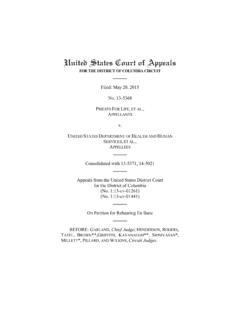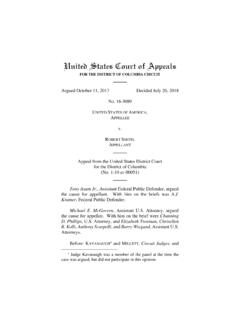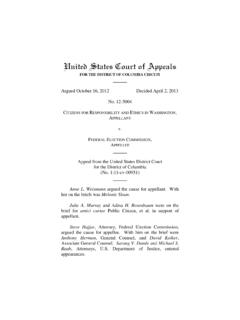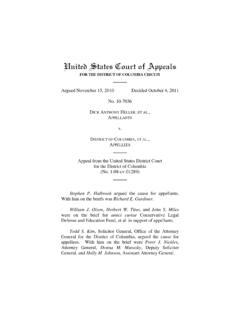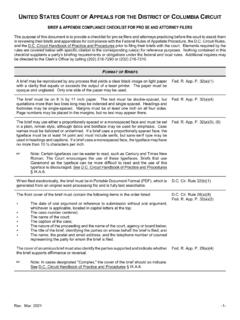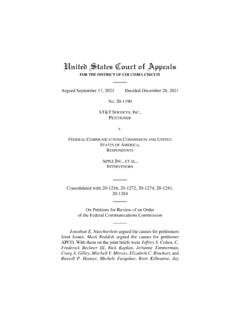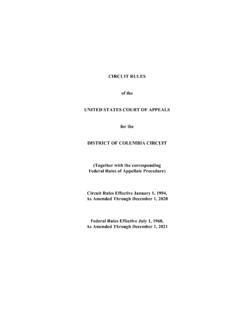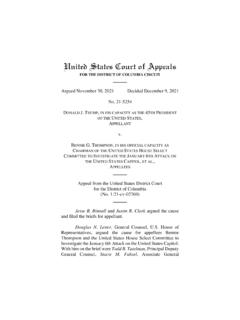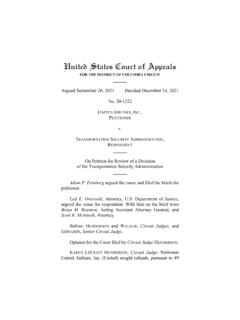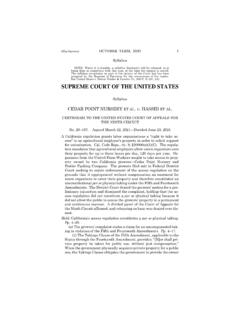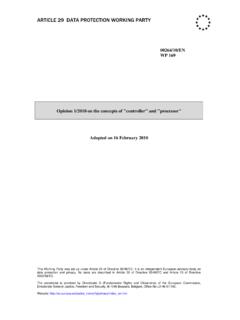Transcription of United States Court of Appeals
1 United States Court of Appeals FOR THE DISTRICT OF COLUMBIA CIRCUIT Argued October 7, 2021 Decided February 1, 2022 No. 20-1396 AMERICAN FEDERATION OF GOVERNMENT EMPLOYEES, AFL-CIO, PETITIONER v. FEDERAL LABOR RELATIONS AUTHORITY, RESPONDENT Consolidated with 20-1397, 20-1404 On Petitions for Review of an Order of the Federal Labor Relations Authority Matthew W. Milledge argued the cause for petitioners. With him on the briefs were David A. Borer, Andres M. Grajales, Judith E. Rivlin, Teague P. Paterson, Gregory O=Duden, Julie M. Wilson, and Allison C. Giles. Noah Peters, Solicitor, Federal Labor Relations Authority, argued the cause for respondent. With him on the brief were Rebecca J. Osborne, Deputy Solicitor, and Sarah C.
2 Blackadar, Attorney. Before: TATEL, PILLARD and JACKSON, Circuit Judges. opinion for the Court filed by Circuit Judge JACKSON. 2 JACKSON, Circuit Judge: By statute, certain federal employers are required to engage in collective bargaining with their employees representatives whenever there is a management-initiated change to the conditions of employment affecting such employees. Federal Service Labor-Management Relations Statute, 5 7103(a)(12); see also id. 7102(2), 7103(a)(14). Congress has defined conditions of employment to include personnel policies, practices, and matters .. affecting working conditions, with certain enumerated exceptions. Id. 7103(a)(14). And from the mid-1980s until the policy statement challenged here, the Federal Labor Relations Authority ( FLRA ) interpreted these statutory provisions to require collective bargaining over any workplace changes that have more than a de minimis effect on such working conditions.
3 In September of 2020, the FLRA adopted a new threshold for when collective bargaining is required. Under the agency s new standard, the duty to bargain is triggered only if a workplace change has a substantial impact on a condition of employment. Dep t of Educ., 71 968, 971 (2020). The petitioners are public-sector labor unions that challenge the FLRA s decision to alter the bargaining threshold; they maintain that the FLRA s new standard is both inconsistent with the governing statute and insufficiently explained, and is therefore arbitrary, capricious, and contrary to law. In the opinion that follows, we hold that the FLRA s decision to abandon its de minimis exception in favor of a substantial-impact threshold was not sufficiently reasoned, and thus is arbitrary and capricious in violation of section 706 of the Administrative Procedure Act ( APA ), 5 706(2)(A).
4 We therefore grant the unions petitions for review and vacate the FLRA s policy statement. BACKGROUND Before the fall of 2020, it was the longstanding view of the FLRA that, despite certain federal employers clear statutory 3 duty to engage in collective bargaining over conditions of employment, 5 7103(a)(12), some public-sector management decisions were not subject to bargaining if they had only a de minimis impact on such conditions. Dep t of Health & Human Servs. Soc. Sec. Admin., 24 403, 407 (1986); see also Dep t of Health & Human Servs. Soc. Sec. Admin. Reg. V, 19 827, 834 (1985) (McGinnis, concurring); Dep t of Health & Human Servs. Soc. Sec. Admin. Chi. Region, 15 922, 924 (1984). The de minimis impact exception, the FLRA explained, derive[s] from the Latin phrase De minimis non curat lex, which.
5 Mean[s] that the law does not care for, or take notice of, very small or trifling matters[.] Dep t of Health & Human Servs. Soc. Sec. Admin, 24 at 407 & (quoting De Minimis Non Curat Lex, BLACK S LAW DICTIONARY (5th ed. 1979)). In other words, the FLRA read 5 7103(a)(12) and (14) to imply a narrow exception to the statute s collective bargaining requirement; one that pertained to management decisions that had only a trivial effect on conditions of employment. In October of 2019, the United States Departments of Education and Agriculture jointly requested that the FLRA issue a general statement of policy changing the impact threshold at which collective bargaining becomes mandatory. See 5 (providing for general statements of policy or guidance).
6 The Departments alleged several problems with the longstanding de minimis standard. For instance, they asserted that the de minimis policy was insufficiently concrete to permit consistent application, causing unnecessary litigation. They also asserted that effective and efficient government would be promoted by the establishment of a clearer standard, and they maintained that the ideal standard would be one under which only a substantial change or, rather, a change having a substantial impact on conditions of employment triggers the duty to bargain. Request for General Statement of Policy or Guidance at 3 4, 3 4. On September 30, 2020, the FLRA adopted the Departments proposed standard over a dissent and without 4 soliciting public comment.
7 In a four-page policy statement, the FLRA announced that an agency will not be required to bargain over a change to a condition of employment unless the change is determined to have a substantial impact on a condition of employment. Dep t of Educ., 71 at 971. The FLRA stated that the more than de minimis test for determining when the duty to bargain is triggered is not the appropriate standard, id., in part because that test had resulted in bargaining whenever management has made any decision, no matter how small or trivial and is also unpredictable, id. at 969. The FLRA further faulted the initial agency decision to adopt the de minimis standard on the grounds that it was insufficiently explained. Id. at 970.
8 With respect to the substantial-impact test, the FLRA suggested that this new standard would create a line that [was] meaningful and determinative[,] and noted that substantial impact is the governing bargaining threshold in the private sector. Id. The FLRA s dissenting member argued that the agency s adoption of a new bargaining threshold was an unjustifiable departure from past precedent and that there was a clear legal basis for the agency s prior adoption of the de minimis standard. See id. at 972 (DuBester, dissenting). The dissent also maintained that the substantial-impact test was contrary to the governing statute, id. at 973, and that the FLRA s policy change was not sufficiently reasoned or explained, id. at 973 76.
9 The petitioners in these consolidated cases the American Federation of Government Employees, AFL-CIO, the National Treasury Employees Union, and the American Federation of State, County and Municipal Employees, AFL-CIO are labor unions that represent employees of government agencies that the FLRA s policy change covers. Each filed a timely petition for review of the FLRA s policy statement, and we consolidated the petitions. The unions have standing as employee representatives whose bargaining position would be fundamentally diminished under the FLRA s new interpretation, see Nat l Treasury Emps. Union v. Chertoff, 452 839, 853 ( Cir. 2006), and we have jurisdiction over 5 their petitions for review, see 5 7123(a).
10 The unions challenge the FLRA s policy statement on two grounds, both of which implicate APA standards. First, they argue that the new substantial-impact threshold rests on an impermissible reading of 5 7103(a)(12) and (a)(14); they contend, in particular, that removing management-initiated changes whose effects are more than de minimis but less than substantial from the scope of collective bargaining is contrary to the plain and unambiguous language of these statutory provisions. Second, the unions assail the FLRA s policy statement adopting the substantial-impact standard as arbitrary and capricious. See 5 706(2)(A). In this regard, according to the unions, the FLRA s explanation for dispensing with its old policy and adopting the new one was insufficient to support the policy change.
